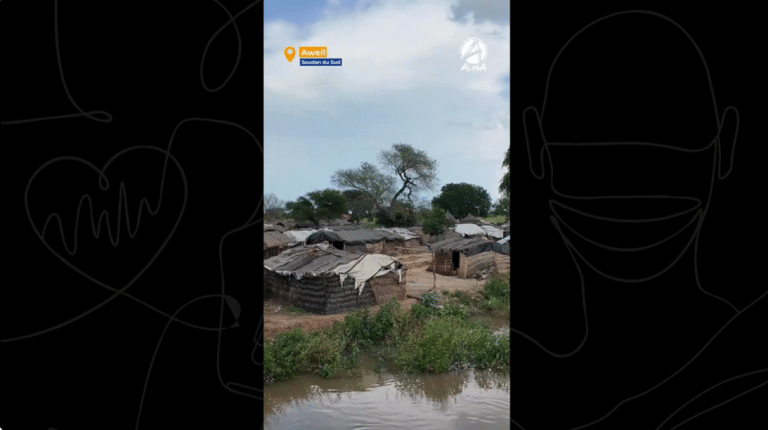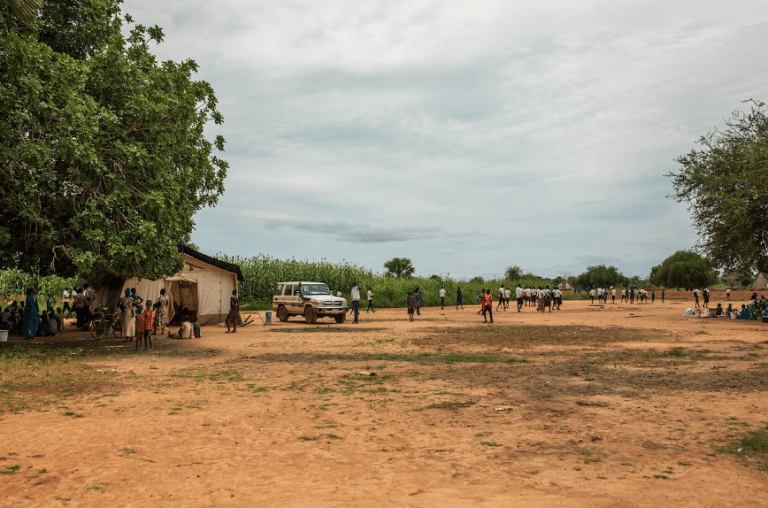South Sudan: ALIMA’s Actions on the Ground
📍 ALIMA presence since: 2017 – 2021, resumed in 2025
🛡️ Mission status: Ongoing
🔹 Key areas of expertise: Epidemic response | Pediatrics | Women’s health | Malnutrition | Health system strengthening
Humanitarian situation in South Sudan
Since its independence in 2011, South Sudan has faced one of the world’s most severe humanitarian crises. The situation worsened significantly in 2025, due to the ongoing conflict in neighboring Sudan, internal insecurity, epidemics, and the collapse of the health system.
The Aweil region is particularly vulnerable, impacted by repeated floods, chronic food insecurity, limited access to healthcare, and population displacement.
📌 Key figures of the crisis in South Sudan
Medical aid and humanitarian response in South Sudan
In July 2025, ALIMA relaunched its operations in Northern Bahr el-Ghazal State, in Aweil East and Aweil Central counties. The intervention is conducted in collaboration with the country’s Ministry of Health.
🧿 Response to epidemic outbreaks
During the rainy season, ALIMA has implemented a “test and treat” program to fight malaria in rural areas around Aweil. Community workers test patients across six remote sites and immediately administer treatment to those who test positive, helping to prevent severe forms of the disease.
Additionally, an epidemiological surveillance system has been set up to monitor other emerging diseases reported in the country, including cholera (over 2,400 cases in 2025).
⚖️ Maternal and newborn health
Basic emergency obstetric and newborn care (BEmONC) is being rolled out at the Maper Health Center and expanded to Akwem from summer 2025 onward.
Trained midwives will ensure safe births and manage obstetric complications.
👶 Pediatrics
ALIMA plans to provide care for children under 15 at the Akwem Primary Health Center.
The most common conditions include malaria, acute respiratory infections, and malnutrition.
🍽️ Fight against malnutrition
Community screening actions are planned, in connection with the MUAC-Mothers bracelet.
🧑⚕️ Strengthening the health system
ALIMA is working in close collaboration with the national health authorities in existing structures, which are sometimes non-functional upon arrival (primary health centers). The goal is to strengthen local capacities: medicine supply, staff supervision, training, and implementation of protocols.
Overview of our past interventions (2017–2021)
Between 2017 and 2021, ALIMA conducted several projects in the Western Bahr el-Ghazal region, including in Raja and Wau. Our teams:
- Tackled child malnutrition, training over 12,000 mothers to use the MUAC-Mothers bracelet to detect malnutrition early;
- Provided primary and secondary healthcare, including over 600 assisted births and 1,700 medical consultations in 2020;
- Responded to emerging outbreaks, such as Ebola and COVID-19, by training 195 healthcare workers in prevention measures and health alert management.
These past interventions have enabled ALIMA to resume its activities with solid knowledge of the context and the needs of the local populations.
On the ground
Our News from South Sudan

She gave birth without complications for the first time: Ahew’s story, a symbol in Aweil, South Sudan
At the Maper Health Center in northern South Sudan, the arrival of ALIMA, in partnership with MSF-France, has transformed care for pregnant women.

South Sudan: when the climate crisis becomes a health crisis
In Aweil, recurring floods cut off entire villages. Malaria, diarrhea, pneumonia: children are on the front lines. Since 2025, ALIMA has been deploying an emergency

ALIMA resumes its activities in South Sudan to respond to the emergency
As the humanitarian situation in South Sudan continues to worsen, and many international organizations reduce or suspend their operations, ALIMA is redeploying an emergency medical


